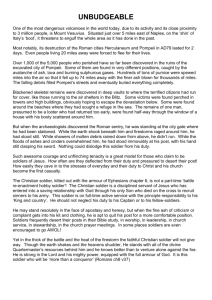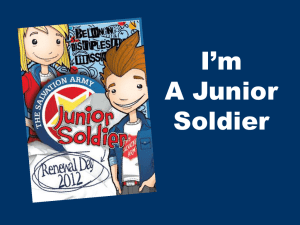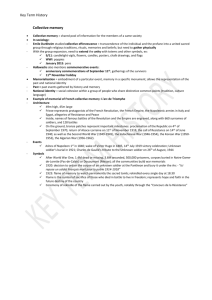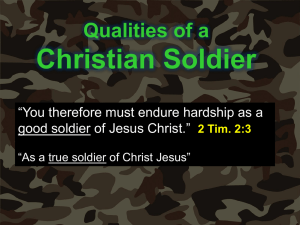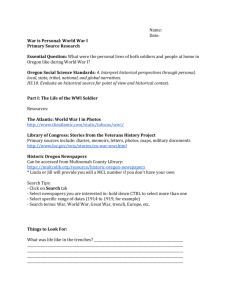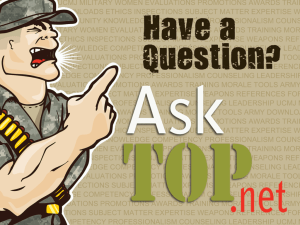Behavioral Health Combat Stress Tips
advertisement
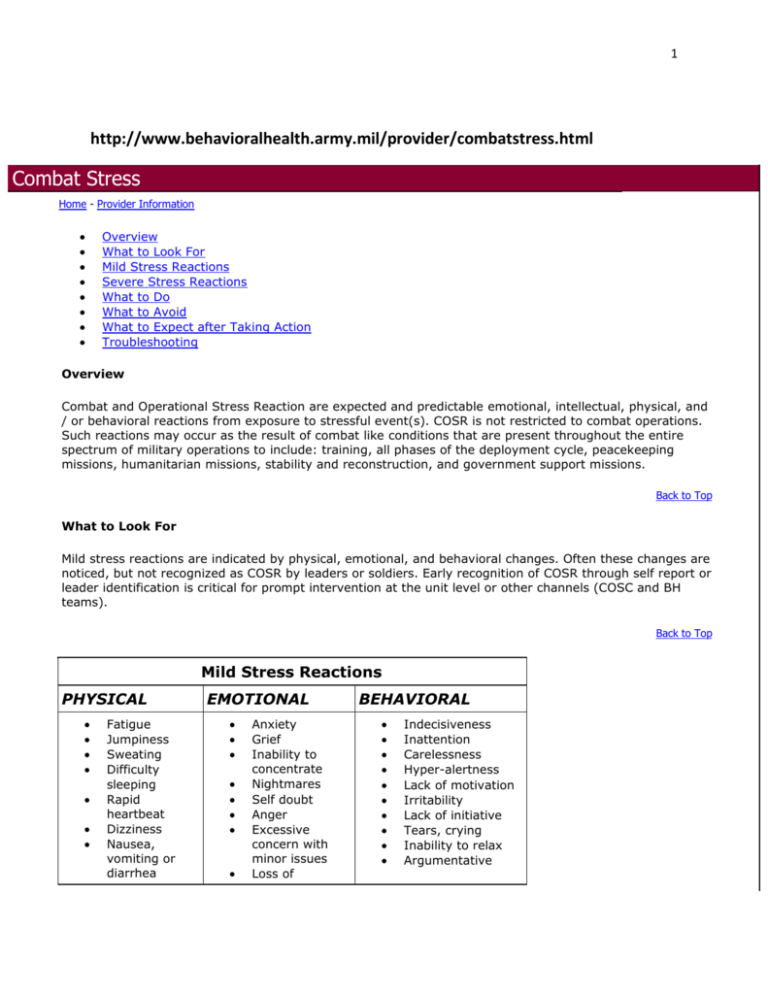
1 http://www.behavioralhealth.army.mil/provider/combatstress.html Combat Stress Home - Provider Information Overview What to Look For Mild Stress Reactions Severe Stress Reactions What to Do What to Avoid What to Expect after Taking Action Troubleshooting Overview Combat and Operational Stress Reaction are expected and predictable emotional, intellectual, physical, and / or behavioral reactions from exposure to stressful event(s). COSR is not restricted to combat operations. Such reactions may occur as the result of combat like conditions that are present throughout the entire spectrum of military operations to include: training, all phases of the deployment cycle, peacekeeping missions, humanitarian missions, stability and reconstruction, and government support missions. Back to Top What to Look For Mild stress reactions are indicated by physical, emotional, and behavioral changes. Often these changes are noticed, but not recognized as COSR by leaders or soldiers. Early recognition of COSR through self report or leader identification is critical for prompt intervention at the unit level or other channels (COSC and BH teams). Back to Top Mild Stress Reactions PHYSICAL Fatigue Jumpiness Sweating Difficulty sleeping Rapid heartbeat Dizziness Nausea, vomiting or diarrhea EMOTIONAL Anxiety Grief Inability to concentrate Nightmares Self doubt Anger Excessive concern with minor issues Loss of BEHAVIORAL Indecisiveness Inattention Carelessness Hyper-alertness Lack of motivation Irritability Lack of initiative Tears, crying Inability to relax Argumentative 2 confidence in self and unit Frequent urination Slow reaction times Dry mouth Muscular tension Back to Top Severe stress reactions prevent the individual from performing his duties and create safety concerns. These reactions do not necessarily mean that the person must be relieved from duty, but warrant immediate attention by leadership for determination of treatment needs. Severe stress reactions PHYSICAL Constant movement Severe startle response Shaking or trembling Weakness and paralysis Impaired vision, hearing, and touch (loss of sensation) Total exhaustion Immobility Stares vacantly Acute abdominal pain Impaired speech or muteness Staggers or sways Heart palpitations Hyper ventilation Insomnia/Severe sleep disturbance EMOTIONAL Anxiety Grief Inability to concentrate Nightmares Self doubt Anger Excessive concern with minor issues Loss of confidence in self and unit BEHAVIORAL Indecisiveness Inattention Carelessness Hyper-alertness Lack of motivation Irritability Lack of initiative Tears, crying Inability to relax Argumentative Back to Top What to Do COSC utilizes the management principles of brevity, immediacy, contact, expectancy, proximity, and simplicity (BICEPS). These principles apply to all COSC interventions or activities throughout the theater, and are followed by COSC personnel in all BH/COSC elements. These principles may be applied differently based on a particular level of care and other factors pertaining to mission, enemy, terrain and weather, troops and support available, time available, and civil considerations (METT-TC). 3 Brevity: Initial rest and replenishment at COSC facilities located close to the Soldier's unit should last no more than 1 to 3 days. Those requiring further treatment are moved to the next level of care. Since many require no further treatment, military commanders expect their Soldiers to RTD rapidly. Immediacy: It is essential that COSC measures be initiated as soon as possible when operations permit. Intervention is provided as soon as symptoms appear. Contact: The Soldier must be encouraged to continue to think of himself as a warfighter, rather than a patient or a sick person. The chain of command remains directly involved in the Soldier's recovery and RTD. The COSC team coordinates with the unit's leaders to learn whether the overstressed individual was a good performer prior to the COSR. Whenever possible, representatives of the unit or messages from the unit tell the Soldier that he is needed and wanted back. The COSC team coordinates with the unit leaders, through unit medical personnel or chaplains, any special advice on how to assure quick reintegration when the Soldier returns to his unit. Expectancy: The individual is explicitly told that he is reacting normally to extreme stress and is expected to recover and return to full duty in a few hours or days. A military leader is extremely effective in this area of treatment. Of all the things said to a Soldier suffering from COSR the words of his small-unit leader have the greatest impact due to the positive bonding process that occurs. A simple statement from the smallunit leader to the Soldier that he is reacting normally to COSR and is expected back soon has positive impact. Small-unit leaders should tell Soldiers that their comrades need and expect them to return. When they do return, the unit treats them as every other Soldier and expects them to perform well. Proximity: Soldiers requiring observation or care beyond the unit level are evacuated to facilities in close proximity to, but separate from the medical or surgical patients at the battalion aid station (BAS) or medical company nearest the Soldiers' unit. It is best to send Soldiers who cannot continue their mission and require more extensive intervention to a facility other than a hospital, unless no other alternative is possible. Combat and Operational Stress Reactions are often more effectively managed in areas close to the Soldier's parent unit. On the noncontiguous battlefield characterized by rapid, frequent maneuver and continuous operations, COSC personnel must be innovative and flexible in designing interventions which maximize and maintain the Soldier's connection to his parent unit. Simplicity: Indicates the need to use brief and straightforward methods to restore physical well-being and self confidence. The actions used for COSC (commonly referred to as the 5 R's) involve the following actions: Reassure of normality (normalize the reaction). Rest (respite from combat or break from work). Replenish bodily needs (such as thermal comfort, water, food, hygiene, and sleep). Restore confidence with purposeful activities and talk. Retain contact with fellow Soldiers and unit. The main principle is to treat responses to combat stress as normal rather than assuming the Soldier is having emotional problems. Remember, in most cases what you are seeing is a normal response to an abnormal situation. Give your Soldier the benefit of the doubt. First intervene at the lowest and simplest level possible to get your Soldier back on track, and then take further actions as needed. Unless you feel the Soldier is at risk for hurting himself or others, first see if he has a problem you can solve through leadership and listening. Here are some things you can do if one of your Soldiers seems to be having trouble after a combat experience: Observe the Soldier and see what you think may be the problem. Privately and directly ask how the Soldier is doing at a time that maximizes the Soldier's likelihood 4 to talk. Use active listening skills so that the Soldier will open up. If reluctant to talk, help the Soldier understand that you are concerned about what you see and you want to help. Listen closely for what may be the underlying problems. Suggest some possibilities (sounds like you are having problems with.). If you think the Soldier might be suicidal, take appropriate action. If a problem is identified, ask if the Soldier would like some help with it and what type of help would be useful. If forward-deployed and possible, ask if a short break to recuperate would be helpful, then escort the Soldier to your supporting BH asset or COSC unit. If in garrison (sometimes the effects of combat stress can take weeks or months to show up), ask the Soldier if you can set up a meeting for them with someone who can help, then set up the meeting before they leave your office. Back to Top What to Avoid The idea is for leaders to let their Soldiers know they are safe and in good hands if they ask for help. If you can communicate your genuine concern for your Soldiers they will tell their fellow Soldiers that seeing you was the right thing to do and that you had their best interests in mind. Here are some things to avoid that might destroy their trust, close the lines of communication, or deter other Soldiers from asking for help in the future: Minimizing or not taking the problem seriously. Saying "is that all?" Overreacting to the problem. Giving simplistic advice. Saying "all you have to do is." Telling the Soldier to "suck it up," or "get over it." Keeping the problem to yourself rather than getting the appropriate chain of command involved. Telling personnel who do not have to know, making the problem a source of unit gossip. Ignoring the problem and hoping it will go away. Delaying a necessary referral for more specialized help. Back to Top What to Expect after Taking Action Most Soldiers will respond positively to unit leaders taking an interest in their problems if it is done with their best interests in mind. The Soldier will get assistance from the asset to which they were referred, and that agency will send them to the next higher level of intervention if needed, such as a mental health clinic. Assets above the level of a rest and recuperation unit may not give feedback to the command on the Soldier's progress unless the Soldier specifically gives them permission to do so. The Soldier should be willing to keep leaders apprised of general progress with the problem so far as it affects unit readiness, but is not obligated to divulge every detail. Back to Top Troubleshooting Soldier does not endorse a problem: 5 In order to help a Soldier who is reluctant to disclose a problem you may want to reassure the Soldier, convincingly and genuinely, that you have the best of intentions and only want to help. You want to see the Soldier get better not only because you are concerned about what you have seen and heard, but also because you want the Soldier to take care of the problem before the problem gets out of hand and starts affecting performance as well as the readiness of the unit. Emphasize to the Soldier that you are all in this together. When one Soldier hurts the whole unit hurts. Therefore, it is important for you to make sure that the Soldier is doing well and not just having to suck it up. You may also want to emphasize that getting help is a sign of strength and loyalty to the unit because they are making sure that they are ready to be there for fellow Soldiers and would want fellow Soldiers to do the same. If the Soldier continues to be reluctant in disclosing the problem reinforce that you are always available to talk if they should change their mind. Soldier gets angry when asked about problem: If the Soldier gets angry when asked about the problem it may be due to several factors. For example, the Soldier may be ashamed of having the problem noticed, resentful due to feelings that the unit is the problem, or may feel that nobody can understand or help with the problem. The Soldier may also place blame on themselves for the problem or perhaps feel guilty for not getting a grip on life. Take this opportunity to turn the emotion toward getting help. The trick is to get the Soldier to endorse frustration and sadness and realize that problem solving is not a solo operation. Keep the focus on what your Soldier is feeling. Do not accuse the Soldier of not giving 100 %. This will only increase anger. Say, "you seem really angry about." to show your understanding and promote discussion. If you can get the Soldier to endorse the anger, you can probably get acknowledgment that help would be welcomed. In order to get the Soldier to accept help from the command, the Soldier will need to trust that the command is truly interested in helping. Good listening will go a long way toward building this trust. Soldier does not want help In this case the Soldier has endorsed that there is a problem and does not want help. The Soldier may or may not say why, but it is probably because of the belief that it is no one else's business or concern of negative career implications. Reassure the Soldier, convincingly and genuinely, that you have the best of intentions and only want to help. You want to see the Soldier get better not only because you are concerned about what you have seen and heard, but also because you want the Soldier to take care of the problem before the problem gets out of hand and starts affecting performance as well as the readiness of the unit. Emphasize to the Soldier that you are all in this together. When one Soldier hurts the whole unit hurts. Therefore, it is important for you to make sure that the Soldier is doing well and not just having to suck it up. You may also want to emphasize that getting help is a sign of strength and loyalty to the unit because they are making sure that they are ready to be there for fellow Soldiers and would want fellow Soldiers to do the same. If you are in the field, you can order the Soldier to your supporting BH or COSC asset for "three hots and a cot" and further observation. They, in turn, will either observe that the Soldier is recuperated and send them back to duty, or will refer them to a higher level of care. Soldier agrees to get help but does not follow through: Sometimes a Soldier will agree to get help, but for any number of reasons may not follow through. The Soldier may decide the problem is not bad enough and can fix it alone. The Soldier may have agreed to get help just to get out of your office, or may have genuinely forgotten the time of the appointment. In any case the solution is to put the responsibility onto the Soldier to get the needed help. Emphasize that you genuinely want to see your Soldier get better, and listen to any concerns shared. Offer again to help. If there is resistance to your help, emphasize that the bottom line is performance, and that it is ultimately the Soldier's responsibility to take advantage of all the help that is offered so that the problem does not start to affect performance. Be sure the Soldier understands that letting the problem fester and get worse is what will negatively affect progression. 6 Soldier does not get better after getting help: In some cases a Soldier may get help but still not improve. This may be because the Soldier's needs are different and a more intensive intervention is needed, either because the Soldier is not motivated to improve, or because there is a more serious problem such as a personality disorder or mental illness. If you are not having any success at the small unit level, and you feel like you have given it a good effort, then you should refer your Soldier to a professional with more specialized expertise. Soldier seems mentally ill or suicidal but refuses evaluation: See Command Directed Evaluation.

